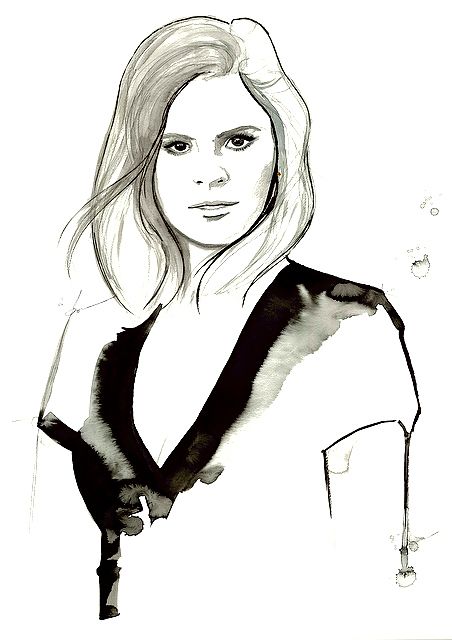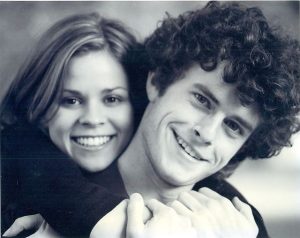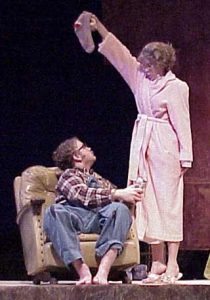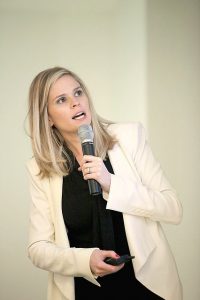
“Have you ever underestimated yourself at work” alumna Meagan Hooper, 35, asked a group of five young women scattered across the country via a Google Hangout video chat one Wednesday evening.
The women gave thoughtful answers that might have made them feel vulnerable had it not been for the instant support they received. This sense of community — women helping other women move ahead in their careers — is exactly what Hooper envisioned when she launched and self-funded the digital media platform bSmart Guide (bSmartGuide.com).
In her 20s, while working in finance, Hooper (’04) noticed the small number of female decision-makers in her industry and in others, and she watched with surprise as many capable female friends were funneled into low-level, administrative roles straight out of college. She wanted to create a way for women to more easily connect with other women and find mentors.
“Many women have dreams for their lives that are quite a bit bigger than they feel is possible. What we try to do is say: Let’s get down to your core sense of purpose and vision for your life. Let’s go big. Let’s talk about that,” says Hooper, who lives in New York City. “Intentional community with a core set of values can change a person’s life.”

Illustration of Meagan Hooper by Jessica Durrant
The site contains more than 1,500 articles (think: profiles of powerful women and tips on how to grow your net worth and achieve balance) and has gotten more than 6.7 million page views to date. Through the site, women can form mentoring groups around certain topics that meet biweekly online for three months, as well as sell products to or buy products from fellow members.
To those who have known Hooper since college, like friend Cambra Overend (’04), the site is very much a reflection of who Hooper is. “Whenever you hang out with Meagan, at some point in the conversation she might ask: ‘Where do you see yourself in five years?’ or ‘What are your goals for the next six months?’ or ‘What are five things we can think of that you can do to improve this situation with your partner/job/mother?’ She is always encouraging and will remember your answers the next time you get together,” says Overend.
Hooper created the site in late 2009 and by May of 2014, managing it became a full-time job to which she devotes roughly 60 to 80 hours a week. She has cultivated a team of 40 volunteers who contribute editing, art direction, marketing and other skills. Right now, she’s focused on growing the site. Monetizing it might come later.

One reason that this dynamo is so big on community is that without finding people who believed in her during her childhood, she probably wouldn’t be where she is today. Her home life in Virginia Beach was nontraditional and often difficult. Her mom, a stay-at-home parent who homeschooled her for several years, and her dad, who worked for a sports equipment company, encountered financial challenges, and her older brother was convicted of several felonies and landed in prison at age 25.
Luckily, Hooper’s youth pastor and his wife — Bruce and Michelle Long, who were in their 30s at the time — took her in when she was 14. “It was a lifesaver,” says Hooper. “It really showed me that the community saw me as someone who belonged and was worth going out of their way for. They’re amazing people. I very much view them like family. I’m in my 30s now and I can’t imagine bringing a 14-year-old into my apartment. In many ways, bSmart Guide is a way for me to replicate what they did for me.”

"How you see yourself affects how others see you and treat you. If you feel like you’re pursuing a role in life that has been cast for you by your circumstances, then cast yourself in the role that you want to play in life.”
The Longs tutored Hooper to help her catch up academically and got her into a high school for the second half of junior year and all of senior year, where she graduated with highest honors. In high school, she loved performing in school plays. “I was drawn to the endless possibilities of acting — that sense of creating or crafting something,” says Hooper.
Then she took what she learned in the theatre and started applying it to her personal life. “I realized that acting isn’t about pretending. It’s about making proactive choices with your mind, body and voice. As a character in a play and also as a person in real life, you have to ask yourself: Do I see myself as poor or wealthy? Privileged or underprivileged? Educated or uneducated? And so on,” says Hooper. “How you see yourself affects how others see you and treat you. If you feel like you’re pursuing a role in life that has been cast for you by your circumstances, then cast yourself in the role that you want to play in life.”

This epiphany allowed Hooper to begin to reinvent herself when she stepped onto the Wake Forest campus, which, initially, was much grander than anything that she’d ever envisioned for herself. Entering as a sophomore transfer student and receiving the Jordan Theatre Scholarship during her junior and senior years, she flourished onstage, taking part in three Mainstage plays and a multitude of productions in the Ring Theatre. Some of her favorites were “Angels in America,” “A Midsummer Night’s Dream” and “A Lie of the Mind.” She was also a member of the Anthony Aston Players theatre club. Her open curriculum even allowed her to create her own study-abroad program in London through Shakespeare’s Globe Theatre.
Even though Hooper came from a different socioeconomic background than many other students, she always felt Wake Forest’s welcoming Pro Humanitate spirit. “For someone like myself who, perhaps, felt like an impostor, the amount of dignity and respect that Wake Forest as a whole communicates to their students is unparalleled,” she says.

Meagan Hooper and Joe Hipps
Wake Forest is also special to Hooper because it’s where she fell in love with her now-husband, Joe Hipps (’04), an opera singer who had a Presidential Scholarship in music. They met when he was giving her a voice lesson in preparation for one of her musical auditions. “He told me that I was really horrible and I should probably give up singing. And then he asked me out immediately after,” says Hooper. The two wed at Graylyn Estate three days before they both graduated in 2004.

After spending a summer in Italy after college, Hooper and her husband moved to New York City, where they still reside, to pursue the arts. (Hipps today is managing director at Trade Informatics, a quantitative research and analytics firm specializing in transaction cost analysis.) For five years, Hooper went on three to six auditions per week, trying out for TV shows like “Law & Order,” “Madame Secretary” and “The Untitled Tina Fey Project” (which became “30 Rock”), as well as comedic movies like “27 Dresses.” Pitched by her agent as a “Reese Witherspoon type with a great sense of humor,” she landed small parts in a few studio films and a Samsung Galaxy commercial. She also dabbled in stand-up comedy. To make ends meet, she began baby-sitting.

One person for whom she baby-sat happened to run his own emerging markets equity research firm and offered her a job editing public company reports, which introduced her to the world of finance. Through another baby-sitting client, she got a job as an administrative assistant at a hedge fund. While working there, she thought about something that she found helpful in theatre at Wake Forest called a “prompt book.”
“If the stage manager or director got hit by a bus, it’s all the cues for the show and where to find everyone. It’s the show in a box, so to speak. It’s a six-inch binder,” says Hooper.
"I’d be running from the hedge fund world to the bathroom, doing big hair, big makeup, auditioning for a soap opera … and running back and seeing, ‘Oh, I got X price on X stock traded.’ Then I’d stay in the office until 2 a.m. updating our marketing materials.”
So she decided to go above and beyond her normal duties and make one for the hedge fund that covered all aspects of the business and helped streamline and update certain processes. Within about 2.5 years of joining the company, at age 27, she was promoted to chief operating officer. And from 2011 to 2014, Hooper took on a third job in finance as senior operations associate for a global wealth management firm.
A friend of Hooper’s who studied theatre with her at Wake Forest, Alison Delaney (’04), can attest to her work ethic. “Above all else, Meagan is one of the most tenacious people I have ever known. Rather than run away from hard work, Meagan seems drawn to it. She’s not discouraged if an idea is shot down, or if she’s told she needs to market something differently, or that she’s at a good starting point but needs to do 10 times the work she’s done already to get a project over the finish line. None of these things scares her — she turns criticism, cynicism and lack of experience into motivation and learning opportunities, which generally brings her success,” says Delaney.

During this time, Hooper was juggling her accidental finance career with her initial dream of becoming an actor. “I’d be running from the hedge fund world to the bathroom, doing big hair, big makeup, auditioning for a soap opera — you know, make this person want to have sex with you — and running back and seeing, ‘Oh, I got X price on X stock traded.’ Then I’d stay in the office until 2 a.m. updating our marketing materials,” says Hooper.
Though this hedge fund career was an unexpected plot twist in her life, she discovered that it was much more glamorous than any film set she worked on. After 10 years in asset management, she started reflecting on how far she’d come and how she could use her skills to help other women achieve, and the idea for bSmart Guide was born. She quit her job to see it through. “The reason I feel so empowered and passionate about helping women accomplish their goals is that I’m a very unlikely person to have had the college experience that I’ve had and the professional experience that I’ve had,” says Hooper.
"The reason I feel so empowered and passionate about helping women accomplish their goals is that I’m a very unlikely person to have had the college experience that I’ve had and the professional experience that I’ve had.”
 But some people in her life, such as her former theatre professor Cindy Gendrich, had a hunch she’d become a star in one form or another. When she thinks of Hooper, Gendrich recalls a scene Hooper performed at Wake Forest in “A Lie of the Mind” opposite Aaron Bokros (’02), who now happens to be married to Alison Delaney. In the scene, Bokros was demanding (in character) that Hooper hand him his socks, which he was too sore to bend over and get. Before that point, Hooper had submissively given them to him, but in this moment, she chose to taunt him with the socks, holding them just out of reach and then yanking them away. Eventually, she gave them to him, but in the meantime, she’d gained the upper hand.
But some people in her life, such as her former theatre professor Cindy Gendrich, had a hunch she’d become a star in one form or another. When she thinks of Hooper, Gendrich recalls a scene Hooper performed at Wake Forest in “A Lie of the Mind” opposite Aaron Bokros (’02), who now happens to be married to Alison Delaney. In the scene, Bokros was demanding (in character) that Hooper hand him his socks, which he was too sore to bend over and get. Before that point, Hooper had submissively given them to him, but in this moment, she chose to taunt him with the socks, holding them just out of reach and then yanking them away. Eventually, she gave them to him, but in the meantime, she’d gained the upper hand.
Gendrich says: “It was so surprising and funny, and she got a wonderful laugh every night, but it was also the moment when we saw her resistance to him kick in. That’s so Meagan — all this humor and strength that you don’t necessarily see coming.”
Jane Bianchi (’05) is a freelance writer. She lives with her husband, Bill McGibony (’06), and daughter, Sally, in Tampa, Florida.

Hooper is often hired by companies to give presentations, including one called “Acting for Success.” She says, “When you change how people perceive you and you’re competent and self-taught, you can do anything.”
Here are three of her tips for getting ahead at work:
PLAY THE STATUS GAME. Rather than “play low” and express approachability, “play high” by taking on the role of a king and acting like you’re in charge — don’t wait for permission to do so.
 MODULATE YOUR VOICE. If you’ve ever been in a meeting and thought, “I don’t think anyone heard me,” or “They all talked over me,” think: slow and low. Speak slowly in a low voice so your colleagues catch every word.
MODULATE YOUR VOICE. If you’ve ever been in a meeting and thought, “I don’t think anyone heard me,” or “They all talked over me,” think: slow and low. Speak slowly in a low voice so your colleagues catch every word.
REMEMBER YOUR OBJECTIVE. In a scene, intention matters. Before you communicate with somebody, ask yourself: What is my goal? Many people have qualitative goals, like “I want to make sure that everyone is pleased with me.” Change it to a quantitative goal — whatever it is that you’re being paid to do at work, like, say, improve the company’s bottom line. That will shift the narrative of your conversation.
– Jane Bianchi (’05)


